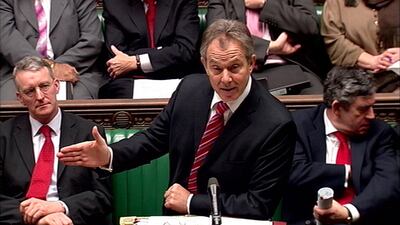Former British prime minister Tony Blair feared his government would face a backlash over its failure to remove extremists from the UK in the aftermath of the 9/11 terrorist attacks.
Newly released Cabinet papers from the UK's National Archives in Kew reveal concerns Mr Blair had over copycat attacks and public concern that action had not been taken to deport extremists.
The cache of documents reveals the government raised concerns within two days of the atrocities, which killed about 3,000 people.
"The government could in due course face pressure to explain why it did not expel from the country certain prominent supporters of Islamic fundamentalism," the Cabinet discussion notes said.
David Blunkett, the UK's Home secretary at the time, said it was "particularly difficult" to deal with the threat of suicide bombers.
"The police are keeping a watch on those individuals and organisations in the UK known to be sympathisers with Islamic extremism," he said.
A month later, Mr Blunkett reported back that the UK's internal security services were working to expel dissidents.
"Work is in hand with the Crown Prosecution Service on powers of removal and on the scope of deportations to safe third countries. Much progress has been made on working up contingency arrangements for London and the rest of the UK.
"There is a danger that the more the government explains what it is doing, the more it might expose the difficulties and increase public anxiety."

Prior to the attacks, Mr Blair's government tried to expel Egyptian preacher Hani Al Sibai owing to his links to Al Qaeda, but he was allowed to remain in Britain because the government failed to secure an undertaking from Egypt that he would not be tortured or mistreated if he was returned.
Recently, Mr Blair's Institute for Global Change named six extremists, including hate preacher Anjem Choudary, who it says are responsible for shaping the ideology that persuaded hundreds of British to fight in Syria and Iraq.
The 2001 papers also revealed Mr Blunkett had concerns surrounding tensions among young Muslims following the attacks.
"Younger generations within the Muslim communities need to be carefully monitored," he said.
At the time protests were taking place and there had been incidents of attacks on teachers, pupils and Sikhs by young Muslim men, the papers said.
"The government needs to tackle problems of extremism among young Muslims," Mr Blair said.
He also called for immediate efforts for nations to join together and fight against Al Qaeda as a united front.
"It is important to ensure that the international community, including Russia, China and friendly states of the Muslim world, present a united front," he said.
"It is essential to reinvigorate the Middle East Peace process. Experience shows extremists exploit political vacuums.
"The world needs to be alert that battle lines are being drawn up between the Muslim world and the West."
Other issues raised in the documents include Mr Blair's lobbying of Kuwait to urge it to buy the UK’s latest artillery as compensation for Britain's support during the Gulf War.
The documents showed he repeatedly lobbied Crown Prince Sheikh Sa’ad between 1998 and 1999.
Internal briefing notes the day before the visit, contained in files, show Mr Blair was told the government was “frankly disappointed” to have “won so little Kuwaiti defence business since end of Gulf War”, saying it had been a “loyal friend to Kuwait over many years”.
In another previously confidential file, it was revealed UN law meant the UK was an "attractive destination for asylum seekers".
It showed Mr Blair's government's attempts to tackle immigration were partly thwarted by a UN protocol that meant the UK was fundamentally deemed an “attractive destination” for asylum seekers, internal memos suggest.
Home Office permanent secretary Sir David Omand said the 1951 Refugee Convention – which says refugees should not be sent back to a country where they face serious threats to their safety – and the “generous reception” given to people from Yugoslavia were partly to blame.


